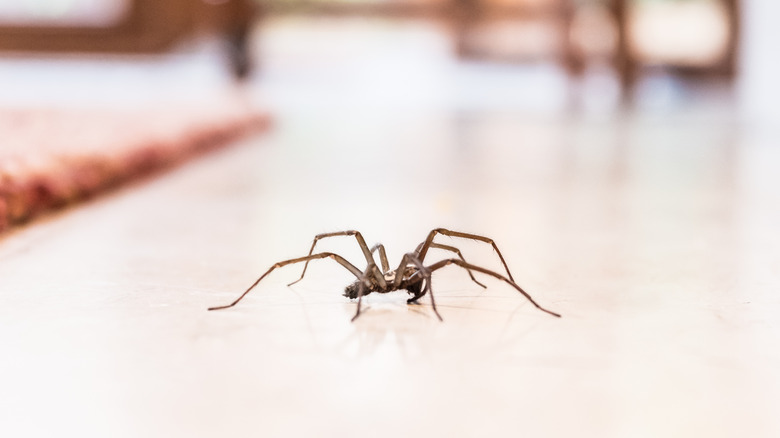Is Swallowing Spiders In Your Sleep A Myth?
You can blame horror movies like the 1981 slasher film "Deadly Blessing" (which showed a spider crawl into a sleeping Sharon Stone's mouth) or that well-known bit of trivia about how, on average, a person swallows up to eight spiders a year in their sleep. This fear of accidentally ingesting a spider while you snooze has not gone anywhere. Talk about things you didn't realize were ruining your sleep.
But is there any truth to this claim? Can we really end up swallowing a spider when we're asleep? Experts seem to think it's highly unlikely, for a number of reasons.
For starters, we humans are just big objects, as far as these eight-legged arachnids are concerned. According to biology professor at Hampden-Sydney College in Virginia and former president of the American Arachnological Society, Bill Shear (via Scientific American), "Spiders regard us much like they'd regard a big rock. We're so large that we're really just part of the landscape."
Fact-checking website Snopes traced the urban legend all the way to the '90s, a testament to how readily people tend to believe the things they read on the internet. Moreover, if one were to really think about it, a sleeping human is probably the last thing a spider would want to get close to.
Spiders would find the noises coming from a sleeping person terrifying
In addition to the simple fact that spiders generally scurry away from humans and don't typically bite them unless they're scared or they're trying to protect themselves, it is also true that the sounds coming from a sleeping person — breathing, heart beating, and sometimes snoring — would absolutely terrify the arthropod.
Spiders don't have ears. They hear their surrounding environment's noises through their legs, which contain fine hairs that pick up vibrations (via Discover Wildlife). And the vibrations that come from someone who's sleeping are more than enough to keep a spider well away. "If someone's sleeping, they're breathing hot air in and out. Why on earth would a spider go in? They just don't do that," said Geoff Oxford, honorary secretary of the British Arachnological Society, to BBC.
Plus, spiders are solitary creatures that prefer secluded, dark crevices to your vast expanse of a bed, per Sleep Foundation. Even with house spiders, who typically don't survive well outdoors, their main interests are the small insects they can eat inside your home, not you, according to Rod Crawford, curator of arachnid collections at the Burke Museum of Natural History and Culture in Seattle (via Treehugger). "They are not bloodsuckers, and have no reason to bite a human or any other animal too large for them to eat. In any interaction between spiders and larger creatures like humans, the spiders are almost always the ones to suffer."
You will know a spider is on your face before you swallow one
Just like you might notice a spider bite when you're outdoors camping or hiking, you're going to notice (and wake up) if there's an eight-legged arachnid crawling on your face trying to get in your mouth. "You'd know about it long before it bit you," explained Cambridge University's department of zoology professional, Matt Wilkinson (via BBC). While the chance of this happening is negligible to none, you would have to be really knocked out to not feel a spider going into your mouth.
Which brings us to the entire idea of swallowing something while you're asleep. While we do swallow occasionally when we slumber, humans have long swallow-free periods at night, which makes ingesting an actual spider all the more unlikely.
It's interesting to look at why such a wild claim became so popular and entrenched in human minds to begin with. It could be because the fear of spiders (arachnophobia) is most acute in humans when compared with other animals, per Sleep Foundation. According to a 2016 study published in Psychology of Learning and Motivation, our mental biases might have something to do with it too. We might believe such internet myths because it's new information or because it is easy to understand (via Fox8). At other times, we might just believe it because the information is "good enough" and we don't want to spend laborious hours researching it.



